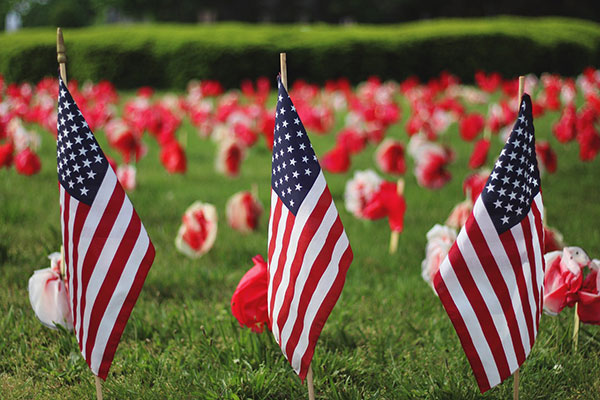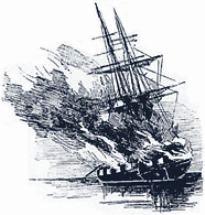|
In Honor of all Those who Served
We sent them off Flags waving, bands playing To defend our shores, To claim new lands, To banish tyranny and evil. Or, even, once, To sew the country Back together. But we were never ready When they returned One at a time From distant places Damaged on our behalf. Some came back Missing pieces, left, In haste and violence, On some battlefield, Rarely remembered by us. Some came back But left intangibles, Minds affected like The bodies of their buddies. And some came back As only a memory, A paper apology for our loss, Of course, only a tiny Loss compared to that of he or she Who never will come back. Once a year, today, We wave those flags, Bands play, speeches are made And we remember Those we sent off Without being ready For them to return.
0 Comments
With the COVID quarantines we have been unable to play. However, for those of you interested in the American War for Independence and small skirmish actions, he is a short vignette of the second battle between the rebellious colonists and the British, and the first time a Royal Navy ship was lost in the war. The Battle of Chelsea Creek is also known as the Battle of Hogg Island or the Battle of Noddle's Island.
Several islands dotted Boston Bay at the time of the Revolution. Most have been reclaimed as dry land in the 19th and 20th centuries. But in 1775, with Boston under siege, they were a flashpoint. The islands were used for grazing livestock and, with British naval control, were easily accessible by the besieged redcoats. The rebels found this detrimental to the efficiency of the siege and had, on May 21, thwarted an effort by the British to obtain forage and livestock from Grape Island by removing the animals and burning the hay. General Artemas Ward, in command of the rebel army, next set his eye on Noddle’s and Hog Islands. Vice-Admiral Samuel Graves had placed several guard boats around the islands to protect them from the rebels. Ward dispatched Colonel John Stark and his 1st New Hampshire Regiment to gather in the livestock and deny the forage to the British. Stark set out from his camp in Medford just after midnight and crossed the ford across Belle Isle Creek to Hogg Island about 10am. Stark dispersed most of his men to gather in the animals while he led a detachment of about 30 men over Crooked Creek to Noddle Island to do the same there. Stark had avoided Graves’ guard boats but his presence was clear to the admiral when he started to burn the hay on Noddle Island. About 2pm, Graves ordered the marines to land and ordered his nephew, Lieutenant Thomas Graves, to sail the armed schooner Diana up Chelsea Creek in support. The sloop Britannia followed the Diana. Stark’s party withdrew in front of the marines until they reached Crooked Creek between Hogg and Noddle Islands. Here, squatting down in the mud, the rebels made a stand. The Marines, unable to make any headway against the strong position, withdrew out of musket range. Diana, on the ebb tide, was soon in trouble, having pushed too far in trying to foil the rebels. While most of Stark’s men continued to hurry the sheep, pigs, and cattle toward the interior a call for reinforcements went out to strike the stranded schooner. Lieutenant Graves, realizing his situation, also signaled for help and the admiral quickly dispatched barges and the tender from the 4th rate Somerset, to try to tow the Diana to deeper water. Brittania, being further down the channel, was able to extricate herself. A battle now developed between Stark’s men and from 200-1000 militia (sources vary) under the command of Israel Putnam. The rebels also had two small field pieces, the first time the rebel army used artillery in the revolt. The British fired Diana’s 4 4-pounder guns and also engaged the rebels with musketry from the Marines on the barges and a couple field pieces they had landed on Noddle’s Island. About 10pm the British withdrew, the fire from shore too hot for continued operation and the Diana stuck fast in the mud. Lieutenant Graves transferred his men to the Britannia and abandoned the Diana. Putnam’s men now slogged through the mud and removed everything of value, including the artillery, from the schooner and then set her ablaze. Casualties were low. The colonials suffered only “a few wounded” while Admiral Graves reported two killed and “several” wounded. However, the colonial morale was raised and that of the redcoats lowered. Putnam was subsequently promoted to brigadier. Wargaming The action at Crooked Creek is relatively straightforward, Hogg Island was a tidal island, relatively flat and open with some scrub and copses of trees, perfect for grazing. Pitcairn’s marines numbered about 400 when all gathered, while Stark had about 300 men all told in his regiment. The bank is described as being waist high, and Stark’s men were said to kneel to gain maximal protection. The stream, really an estuary, was muddy and irregular in course, hence its name. For the action against Diana, a small portion of Stark’s command remained with the two field pieces, probably 3 pounders, and Putnam’s militia. The barges could hold 50-60 marines but most of them would, of course, be engaged in rowing. Diana’s guns were of the 4-pounder sort (she is also reported to have up to 12 small swivel guns), as were, most likely, the two guns the British brought to Noddle’s Island. The low number of casualties bespeaks of an action at near maximum range with the militia observing loose order and taking advantage of the more heavily forested main land banks. |
AuthorDiatribes are simply often humorous recountings of the games played by the Long Island Irregulars. We play with toy soldiers and are unabashedly happy to have never lost this part of our childhoods.. Archives
April 2024
Categories
All
|


 RSS Feed
RSS Feed